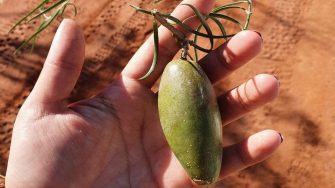Connection To County With And For Older Aboriginal Peoples Living In Urban Australia
Institute member Dr Aryati Yashadhana has co-led research that explores the therapeutic effects of participation in a cultural camp for older Aboriginal peoples.
Institute member Dr Aryati Yashadhana has co-led research that explores the therapeutic effects of participation in a cultural camp for older Aboriginal peoples.

‘Country’ is a multifaceted concept that incorporates a deep, intimate, holistic, complex, localised and reciprocal relationship and connection between Aboriginal and Torres Strait Islander peoples and elements of land, sea, waterways, sky, stars, and living and non-living entities. Whilst connection to Country are critical elements for health and wellbeing, in urban environments such connections can be easily lost. This can especially be felt by older Aboriginal peoples – who through the Stolen Generation – were forcibly displaced and relocated to high urbanised environments.
Walaays – ceremonial camps that occur in cultural landscapes for Aboriginal communities – focus on reconnecting to Country, intergenerational healing, reclaiming languages and traditional ceremony. Previous feedback from those attending walaays suggest that opportunities to forge and strengthen cultural identity and connections to Country and kin have therapeutic impacts, which may in turn be protective factors for health and wellbeing.
Institute member Dr Aryati Yashadhana has co-designed and co-led a study with Yuwaalaraay cultural knowledge holder Ted Fields, that aimed to deliver a walaay for older Aboriginal people who are survivors, family members or descendants of the Stolen Generation and explore how this impacts wellbeing and connection to place. The walaay took place in August 2022 and was held in Dharriwaa (Narran Lakes NSW) – a protected cultural heritage, bird breeding, archaeological and sacred site. The walaay was delivered by Ted Fields and Michelle O’Leary
Several key themes emerged from the yarning circle discussions including childhood memories, participation in sports, preferred foods and reflections on parenting. Specific outcomes of the walaay included:
“This study has highlighted the importance of connection to Country for older Aboriginal people who have – through assimilative policies and practices – been forcibly displaced and relocated to homes and urban areas“ says lead author Dr Aryati Yashadhana.
“We must look beyond colonising methods to policy development and implementation for Aboriginal and Torres Strait Islander peoples – to ensure more culturally appropriate approaches are taken to facilitate intergenerational healing and improve wellbeing outcomes.”
Read the full publication here.